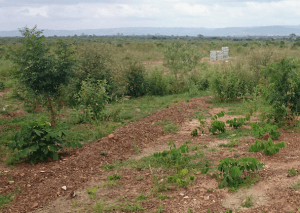Restoring farmers through land valuation and compensation plan
 Agriculture has remained the backbone of Ghana’s economy for more than three decades now with significant contribution to the country’s Gross Domestic Product (GDP) and providing more than 50 per cent employment to the labour force.
Agriculture has remained the backbone of Ghana’s economy for more than three decades now with significant contribution to the country’s Gross Domestic Product (GDP) and providing more than 50 per cent employment to the labour force.
It has been the age old trade from cutlasses, hoes and smaller farming inputs to this era where tractors and other modern equipment is making the business more attractive.
Hitherto, land were easily accessible and with a bottle of schnapps to the chief’s palace or by dint of travelling from far away country to a new and uncultivated land, one becomes owner to the vast of land he could cultivate to feed the family and country.
This trend has however changed and the agriculture sector has recently (from 2014 – till date) lost its leading position and continue to decline.
This observation coupled with the discovery and production of oil and gas in commercial quantities raises concern of the agricultural sector.
The Western Region is noted historically for the cultivation and production of industrial and food crops, notably annual and mid-term crops, rubber, cocoa and oil palm.
The recent oil exploration and production along the coast of the Region is accelerating the conversion of agricultural lands into industrial and commercial purposes particularly within the six coastal districts of Shama, Sekondi-Takoradi Metropolitan Area, Ahanta West, Nzema East, Ellembelle and Jomoro.
Meanwhile, the agricultural landscapes and enclaves are rapidly giving way to industrial uses as a result of leasing agreements negotiated between chiefs, family heads, and landowners on the one hand, and private companies on the other with its issues of inadequate compensation and some upheavals that had risen as a result of the situation.
Mr Kenneth Ansah, the Chairman of the Coalition of Farmer groups within the Region said though growing other sectors of the economy was important, it must be done in the interest of the citizenry.
He said an estimated 25,000 acres of arable land have been lost to oil related infrastructure development including quarries, sand and gravel extraction for the construction industry without any proper compensation mechanisms.
In Shama District alone, around 2,104 acres of arable lands representing 39 per cent of uncultivated lands have so far been cleared by operators of quarries, sand and gravel extraction and other forms of mining companies.
Again, more than 2,334 acres of primarily agricultural lands have been earmarked as free zones and oil and gas enclaves in the same area awaiting development.
According to Mr Ansah, In Ahanta West, an estimated 1,190acres of arable lands have been cleared to make way for oil and gas companies, real estate and related companies.
“Members of Farmer Based organisations, chiefs and individual land owners have raised issues concerning their ability to properly assign monetary values and negotiate for the sale of agricultural lands.”
THE ROLE OF THE DISTRICT ASSEMBLIES
Although the district assemblies have the mandate to regulate land use and development, the oil and gas private sector has become a major stakeholder driving land acquisition and development decisions.
Recently, spatial and land use plans were completed for the six coastal districts to guide land use decision and land allocation for different uses.
Yet chiefs and landowners readily give out large tracts of agricultural land for other commercial and industrial purposes without proper valuation, compensation and negotiation concerning the land given out.
The Chairman said standardised procedure for negotiating and assigning value to crops or lands leased for industrial use must be streamlined.
The majority of tenant and migrant farmers are being displaced and access to secured land for farming is becoming scarce and increasing the poverty and food insecurity within farming communities.
UPHEAVALS
Mr Francis Adarkwa, Coordinator of the Coalition said many have been the fight and growing tension between oil and gas companies and affected communities hence the formation of the coalition “Ahanta West, Jomoro and Ellembelle farmers and Fishermen association” to help address the situation.
He lauded the contribution of the BUSAC Fund to address the issues to avoid “the Niger Delta incidence” in Ghana.
Mr Adarkwa called for a valuation guide developed by the various stakeholders: Land valuation board, farmers, and chiefs, individual land owners, and oil companies, private investors concerning the various crops, land types and location of land.
This guide would provide a price range concerning land with specific crops at various stages of growth, land location and type in the coastal districts.
He said: “There should be a compensation plan, which is operational and chiefs and landowners given the needed training to negotiate better.”
By Mildred Siabi-Mensah
Source: GNA
